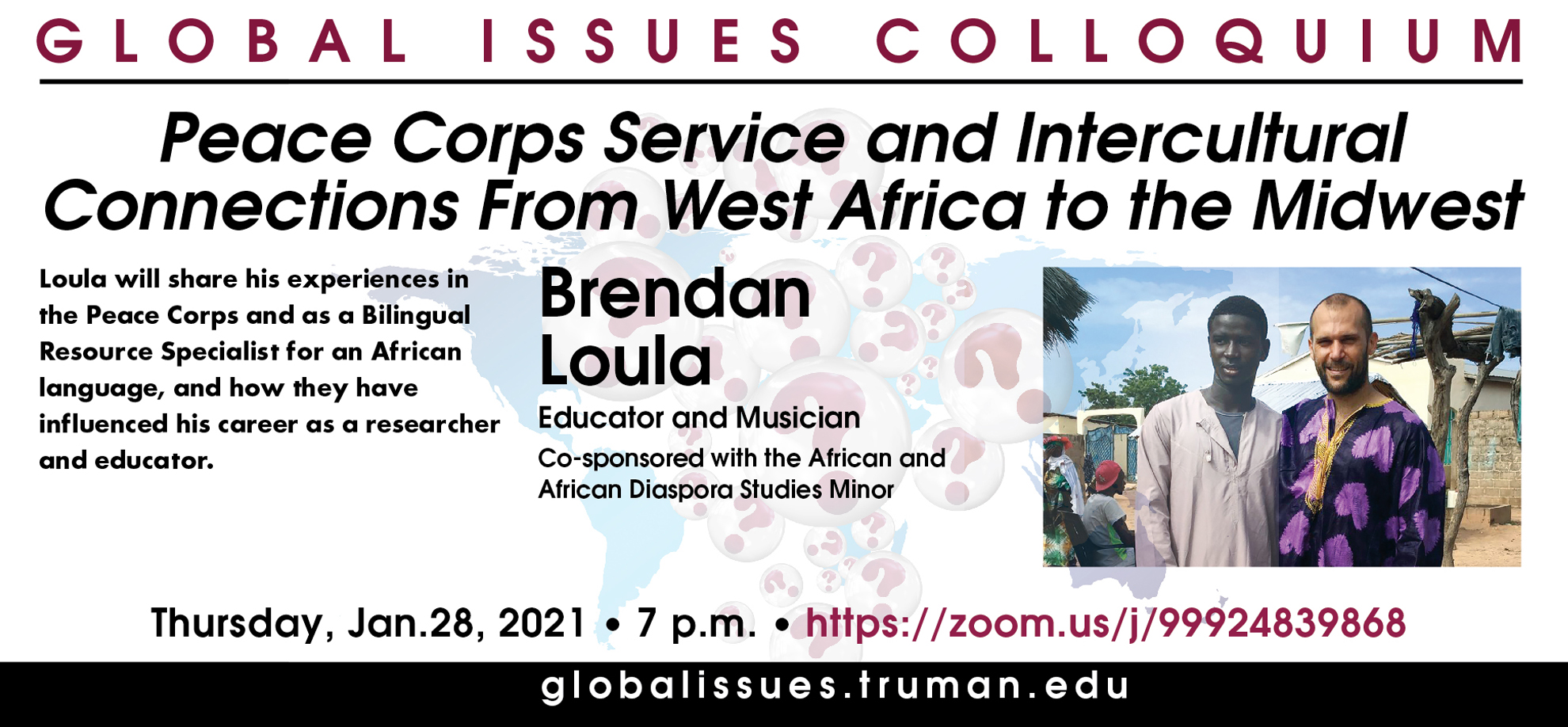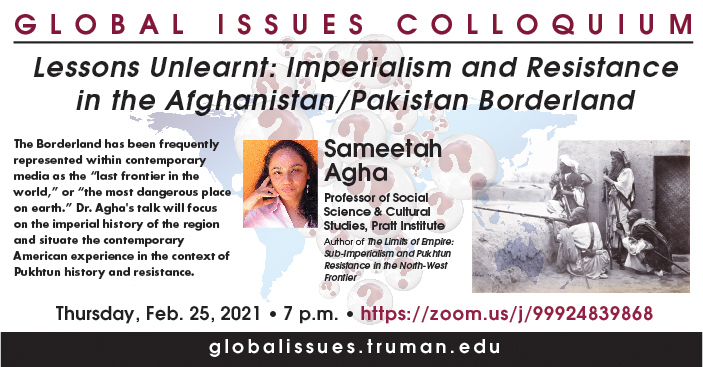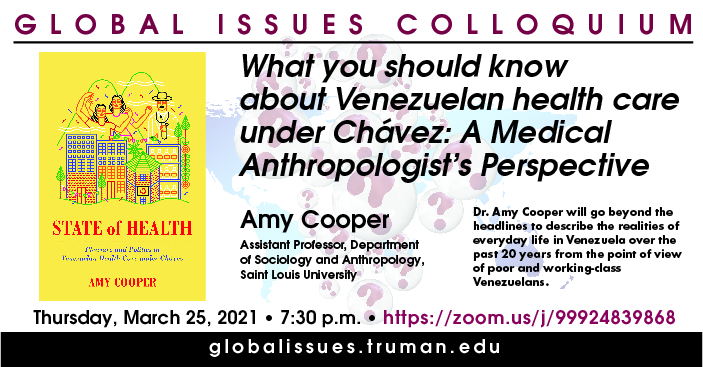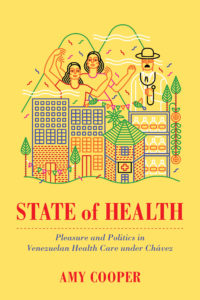Thursday, Jan 28, 7pm
Brendan Loula
Educator and musician
Peace Corps Service and Intercultural Connections From West Africa to the Midwest
Co-sponsored with the African and African Diaspora Studies Minor
Meeting Recording: https://zoom.us/recording/detail?meeting_id=gLtXWs5eTqqDKR80WR7W%2Bg%3D%3D

Brendan Loula is an educator and musician working in the public schools in Madison, WI. After receiving his BA in music at Truman State, he served in the Peace Corps in The Gambia, West Africa, for two years. Once his term of service was up, he studied ethnomusicology at the University of Wisconsin at Madison. After completing his master’s thesis on Mandinka Griots and musical labor, he was hired as the first Mandinka language bilingual resource specialist for the Madison Metropolitan School District. During his tenure as the Mandinka BRS he worked closely with parents in the community and school and district based leaders to improve the outcomes for students whose from the Senegambia region, and families speak Mande languages. He began clubs at a number of schools to encourage students to celebrate African cultures and languages, and recognize the contribution of African cultures to the formation of cultures in the United States. Mr. Loula will share his experiences in the Peace Corps and as a Bilingual Resource Specialist for an African language, and how they have influenced his career as a researcher and educator.
Thursday, Feb 25, 7pm
Sameetah Agha
Pratt Institute
Lessons Unlearnt: Imperialism and Resistance in the Afghanistan/Pakistan Borderland
Meeting Recording: https://zoom.us/rec/share/Ok-QSAyz3AomC2wk4QUKKzyhxW2QqEU5-WGCOTfgRG-SZLroS2HMUtQW81jb7phe.UTaKnnKepNQafrA1

The North-West Frontier or the Afghan/Pakistan borderland has been frequently represented within contemporary media as the “last frontier in the world,” or “the most dangerous place on earth.” It is also the site of the longest, and still ongoing, war in US history. However, the U.S. intervention is only the most recent episode in a longer history of colonial violence and invasions. Dr. Agha’s presentation will focus on the imperial history of the region and situate the contemporary American experience in the context of Pukhtun history and resistance.
Sameetah Agha is Professor of Modern World History at Pratt Institute, Brooklyn, NY where she has taught for over two decades. Her teaching and research areas include: world history, imperialism and colonialism, new military history, colonial warfare and resistance with an emphasis on South Asia and Afghanistan. She has published essays and articles on these topics and is most recently the author of The Limits of Empire: Sub-imperialism and Pukhtun Resistance (Orient Blackswan, 2020). Her talk will focus on her archival and field research in the North-West Frontier or the Afghan-Pakistan tribal borderland which is presented more extensively in her book.
Review of Sameetah Agha’s book The Limits of Empire: Sub-Imperialism And Pukhtun Resistance In The North-West Frontier.
Thursday, March 25, 7:30pm (NOTE DIFFERENT TIME), on Zoom: https://zoom.us/j/99924839868
Amy Cooper
Assistant Professor, Department of Sociology and Anthropology, Saint Louis University
What you should know about Venezuelan health care under Chávez: A Medical Anthropologist’s Perspective

 Dr. Amy Cooper goes beyond the headlines to describe the realities of everyday life in Venezuela over the past 20 years from the point of view of poor and working-class Venezuelans. Her research as a cultural and medical anthropologist focuses on one of the most important shifts in Venezuelan society under socialist leader Hugo Chávez: the transformation of its health care system. Though rarely mentioned in media reporting on Venezuela’s leftist leadership, health care reform improved people’s lives and reshaped the political landscape in the country in ways that are still being felt today. Cooper discusses her in-depth research with Cuban doctors, patients in public clinics, community health activists, and others in the years before the current crisis began. Her work adds nuance and depth to our understanding of Venezuela and offers lessons from one of the most ambitious experiments in universal health care in recent memory.
Dr. Amy Cooper goes beyond the headlines to describe the realities of everyday life in Venezuela over the past 20 years from the point of view of poor and working-class Venezuelans. Her research as a cultural and medical anthropologist focuses on one of the most important shifts in Venezuelan society under socialist leader Hugo Chávez: the transformation of its health care system. Though rarely mentioned in media reporting on Venezuela’s leftist leadership, health care reform improved people’s lives and reshaped the political landscape in the country in ways that are still being felt today. Cooper discusses her in-depth research with Cuban doctors, patients in public clinics, community health activists, and others in the years before the current crisis began. Her work adds nuance and depth to our understanding of Venezuela and offers lessons from one of the most ambitious experiments in universal health care in recent memory.
Amy Cooper is a cultural and medical anthropologist who studies the politics of health care in the Americas. Her book State of Health: Pleasure and Politics in Venezuelan Health Care under Chávez (University of California Press 2019), is based on ethnographic research conducted in Caracas between 2006-2009. Amy lives in St. Louis where she is an Assistant Professor of Anthropology at Saint Louis University.